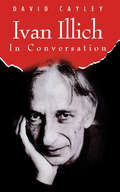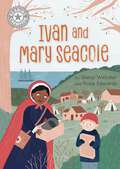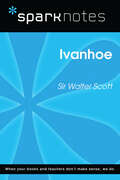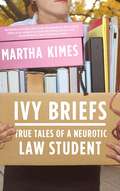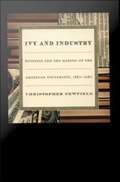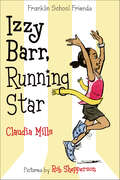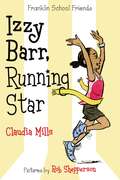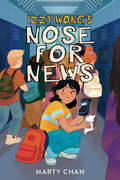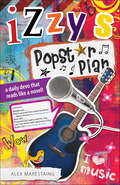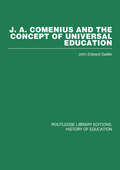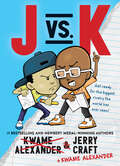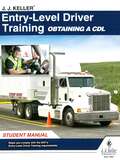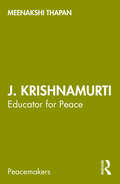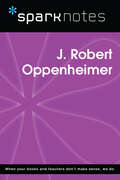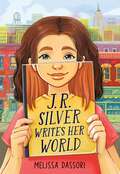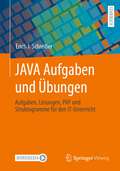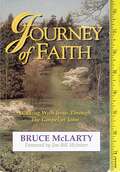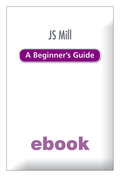- Table View
- List View
Ivan Illich in Conversation: The Testament of Ivan Illich
by David CayleyFor more than fifteen years, iconoclastic thinker Ivan Illich refused to be interviewed. Finally, in 1988, CBC's David Cayley persuaded Illich to record a conversation. This first interview led to additional sessoins that continued until 1992 and are now gathered in Ivan Illich in Conversation. In these fascinating conversations, which range over a wide selection of the celebrated thinker's published work and public career, Illich's brilliant mind alights on topics of great contemporary interest, including education, history, language, politics, and the church.
Ivan and Mary Seacole: Independent Reading White 10 (Reading Champion #517)
by Sheryl WebsterThis story is part of Reading Champion, a series carefully linked to book bands to encourage independent reading skills, developed with Dr Sue Bodman and Glen Franklin of UCL Institute of Education (IOE) Fantastic, original stories are accompanied by engaging artwork and a reading activity. Each book has been carefully graded so that it can be matched to a child's reading ability, encouraging reading for pleasure. Perfect for 5-7 year olds or those reading book band white.
Ivanhoe (SparkNotes Literature Guide Series)
by SparkNotesIvanhoe (SparkNotes Literature Guide) by Walter Scott Making the reading experience fun! Created by Harvard students for students everywhere, SparkNotes is a new breed of study guide: smarter, better, faster. Geared to what today's students need to know, SparkNotes provides: *Chapter-by-chapter analysis *Explanations of key themes, motifs, and symbols *A review quiz and essay topicsLively and accessible, these guides are perfect for late-night studying and writing papers
Ivory Tower Blues
by Anton L. Allahar James CoteThe present state of the university is a difficult issue to comprehend for anyone outside of the education system. If we are to believe common government reports that changes in policy are somehow making life easier for university graduates, we cannot help but believe that things are going right and are getting better in our universities. Ivory Tower Blues gives a decidedly different picture, examining this optimistic attitude as it impacts upon professors, students, and administrators in charge of the education system.Ivory Tower Blues is a frank account of the contemporary university, drawing on the authors? own research and personal experiences, as well as on input from students, colleagues, and administrators. James E. Côté and Anton L. Allahar offer an insider?s account of the university system, an accurate, alternative view to that overwhelmingly presented to the general public. Throughout, the authors argue that fewer and fewer students are experiencing their university education in ways expected by their parents and the public. The majority of students are hampered by insufficient preparation at the secondary school level, lack of personal motivation, and disillusionment. Contrary to popular opinion, there is no administrative or governmental procedure in place to maintain standards of education.Ivory Tower Blues is an in-depth look at the crisis facing Canadian and American universities, the factors that are precipitating the situation, and the long-term impact this crisis will have on the quality of higher education.
Ivy Briefs: True Tales of a Neurotic Law Student
by Martha KimesFrom first-day nerves to first-year grades, from bizarre job interviews to bar exam insanity, Ivy Briefs pulls back the curtain on the marbled halls of law school, revealing the absurdity often bubbling beneath the surface. Meet Martha Kimes: a naïve small-town girl with strong neurotic tendencies who has (due to an inexplicable stroke of luck) been admitted to Columbia Law School. She's a Midwesterner in the middle of Manhattan, a student on the verge of a nervous breakdown. In her candid memoir -- the best of its kind since One L and the only one written by a woman -- Kimes makes her way through law school, doing battle with a memorable cast of characters: The Sadistic Professor: Every law student's nemesis, the Sadistic Professor takes pity on no one. The Socratic Method is his favorite torture device, and he's got staying power that rivals that of the Energizer Bunny. The Gunner: So enamored with the sound of his own voice, he finds it physically impossible to keep his hand from gunning up into the air every time a professor asks a question. Ten minutes into the start of the school year, everyone is already sick of the Gunner. The Do-gooder: Lurking behind a kind exterior is a pit bull ready to pounce on those who don't plan to devote their legal careers to public service. But would she be so quick to categorize all those who dare go into corporate law as loathsome, soulless warriors for the devil if she, too, had student loans to repay? The Boarding School Bastard: He wears a firmly pressed pin-striped oxford shirt and has a condescending attitude bigger than most European countries. By definition he is better than you because he went to Exeter. And he'll never let you forget it. With sharp wit, dead-on aim, and a healthy dose of self-deprecation, Kimes proves that it is possible to survive law school with both your sense of humor and your sanity intact.
Ivy and Industry: Business and the Making of the American University, 1880-1980
by Christopher NewfieldEmphasizing how profoundly the American research university has been shaped by business and the humanities alike, Ivy and Industry is a vital contribution to debates about the corporatization of higher education in the United States. Christopher Newfield traces major trends in the intellectual and institutional history of the research university from 1880 to 1980. He pays particular attention to the connections between the changing forms and demands of American business and the cultivation of a university-trained middle class. He contends that by imbuing its staff and students with seemingly opposed ideas--of self-development on the one hand and of an economic system existing prior to and inviolate of their own activity on the other--the university has created a deeply conflicted middle class. Newfield views management as neither inherently good nor bad, but rather as a challenge to and tool for negotiating modern life. In Ivy and Industry he integrates business and managerial philosophies from Taylorism through Tom Peters's "culture of excellence" with the speeches and writings of leading university administrators and federal and state education and science policies. He discusses the financial dependence on industry and government that was established in the university's early years and the equal influence of liberal arts traditions on faculty and administrators. He describes the arrival of a managerial ethos on campus well before World War II, showing how managerial strategies shaped even fields seemingly isolated from commerce, like literary studies. Demonstrating that business and the humanities have each had a far stronger impact on higher education in the United States than is commonly thought, Ivy and Industry is the dramatic story of how universities have approached their dual mission of expanding the mind of the individual while stimulating economic growth.
Izinkwazi ZoThukela IsiZulu Poetry Anthology: UBC contracted
by Londi P. M. MakhanyaLeli yiqoqo lezinkondlo eziqokelwe ukufundwa ebangeni le-12. Ingxenye yokuqala inezinkondlo eziqokelwe isiZulu uLimi lwaseKhaya. Ingxenye yesibili inezinkondlo eziqokelwe isiZulu uLimi lokuQala olweNgeziwe.
Izinkwazi ZoThukela IsiZulu Poetry Anthology: UBC uncontracted
by Londi P. M. MakhanyaLeli yiqoqo lezinkondlo eziqokelwe ukufundwa ebangeni le-12. Ingxenye yokuqala inezinkondlo eziqokelwe isiZulu uLimi lwaseKhaya. Ingxenye yesibili inezinkondlo eziqokelwe isiZulu uLimi lokuQala olweNgeziwe.
Izzy Barr, Running Star (Franklin School Friends #3)
by Claudia MillsIzzy Barr is the star athlete of the third grade: she hits homeruns on her softball team and is one of the fastest runners in her class. But at home, her half-brother, Dustin, seems to be her father's favorite athlete—why else would her dad go to all of his games and miss so many of hers? Izzy pretends that she doesn't care, but as she, her friends Annika Riz and Kelsey Green, and the rest of their class are gearing up for class field day, she can't help but hope her dad will be there to cheer her on in the big race against her rival, Skipper Tipton. Dad doesn't make it to field day, but when he realizes how important it is to Izzy, he and all of her friends and family are there to watch her participate in the citywide 10K run.
Izzy Barr, Running Star (Franklin School Friends)
by Claudia MillsIzzy Barr is the star athlete of the third grade: she hits homeruns on her softball team and is one of the fastest runners in her class. But at home, her half-brother, Dustin, seems to be her father's favorite athlete―why else would her dad go to all of his games and miss so many of hers? Izzy pretends that she doesn't care, but as she, her friends Annika Riz and Kelsey Green, and the rest of their class are gearing up for class field day, she can't help but hope her dad will be there to cheer her on in the big race against her rival, Skipper Tipton. Dad doesn't make it to field day, but when he realizes how important it is to Izzy, he and all of her friends and family are there to watch her participate in the citywide 10K run. <P><P>Lexile Measure: 810L
Izzy Wong’s Nose for News
by Marty ChanKey Selling Points When Izzy Wong finds out the girls' bathroom was purposely flooded, she knows she's found the perfect subject for her podcast. But her drive to find the culprit and get listeners overtakes her journalistic ethics...and puts her podcast (and investigation) in jeopardy. Izzy Wong's Nose for News shows a middle grader learning about ethical journalism from firsthand experience and making missteps along the way; it's a great springboard for readers to think about the difference between news and gossip or truth and supposition. Shows how smarts and persistence really do pay off, but also how empathy is key to making the right choices. Podcasts are incredibly popular and readers will get some of the inside scoop on how to make one, down to Izzy's choice of audio recorder. Marty Chan is a prolific and award-winning author and playwright, whose books include Cosplay Crime, Final Cut, Willpower, Dragon on the Loose and the Ehrich Weisz Chronicles. He frequently tours and presents to schools.
Izzy's Popstar Plan
by Alex MarestaingIzzy Baxter has big plans—popstar plans. Ever since she was six, she’s dreamed of becoming the world’s next singing sensation. Now sixteen, her singing career is on the rise, and she’s been selected to compete on the hit TV show International Popstar Challenge. As Izzy performs in far off locations such as Tokyo and Paris, it seems as if her plans are coming off without a hitch. But God has plans of His own, and Izzy will soon discover that living for Him is “way cooler” than megastar fame.Presented like a daily blog, set up like a devotional, and read like a novel—this book will be an instant hit with tween girls. This cutting edge new product will meet girls where they are, and girls will love following Izzy on her incredible adventure. Plus, they’ll get daily spiritual food to equip them on their own incredible adventure with God.
J A Comenius and the Concept of Universal Education
by John Edward SadlerOriginally published in 1966, this volume reappraises the educational philosophy of Comenius. Until recently the attention given to Comenius and his work concentrated on a narrow interpretation of his pedagogy which played down his pansophic theory. In the second half of the nineteenth century Germany led the way in pedagogical study and Comenius was widely accepted as having laid the foundations of a science of education. The emergence of education as an academic subject in England and the USA led to a considerable interest in the history of educational ideas and Comenius’ work.
J vs. K
by Kwame Alexander Jerry CraftCreated by real-life rivals and #1 New York Times bestselling authors Kwame Alexander and Jerry Craft this hilarious illustrated story features two talented fifth graders going head-to-head in a competition for the ages. J and K are the most creative fifth graders at Dean Ashley Public School (DAPS). J loves to draw and his wordless stories are J-ENIUS! K loves to write and his stories are K-LASSIC!! Both J and K are determined to win the DAPS annual creative storytelling contest or at least get in the top five. And when they find out that they are both entering The Contest, it's the beginning of one of the most intense rivalries the world has ever seen. It&’s artist vs. writer with plenty of shady double crosses as J and K plot their way to the top. This epic match-up from Newbery medal winners Kwame Alexander (The Crossover) and Jerry Craft (New Kid) celebrates comics, creativity, and the magic of collaboration.
J. J. Keller® Entry-Level Driver Training Obtaining a CDL Student Manual
by J. J. Keller & Associates Inc. ®Helps you comply with the DOT'S Entry-Level Driver Training requirements
J. Krishnamurti: Educator for Peace (Peacemakers)
by Meenakshi ThapanTeacher, thinker, writer, and speaker, J. Krishnamurti (1895–1986) was an Indian educationist, spiritual leader, and key figure in world philosophy. He raised significant questions about the state of the world, about our tendency to remain passive, conditioned, and in a state of overwhelming confusion about how we relate to the world. Through talks and writings spread over many decades and geographical locations, he articulated an unconditioned, reflective approach which emphasised self-inquiry. This volume provides an understanding of Krishnamurti’s views on the human predicament in a disintegrating world, marked by conflict, divisions, wars, and climate change. It also examines his educational thought and its enormous potential for change. Krishnamurti argued that our minds are so conditioned that we are unable to look, listen, or learn without our prior knowledge that foregrounds the role of memory and time. He highlighted the need to work with young children, with a special focus on the school as the centrepiece of his perception for psychological development and educational excellence. It is within an educational setting that Krishnamurti hoped that the seeds for individual and social change will be catalysed. An introspective look at the life and legacy of an eminent twentieth century thinker, this volume will be of great interest to students and researchers of philosophy, education, religion and spirituality, South Asia studies, modern history, and the social sciences.
J. Robert Oppenheimer (SparkNotes Biography Guide)
by SparkNotesJ. Robert Oppenheimer (SparkNotes Biography Guide) Making the reading experience fun! SparkNotes Biography Guides examine the lives of historical luminaries, from Alexander the Great to Virginia Woolf. Each biography guide includes:An examination of the historical context in which the person lived A summary of the person&’s life and achievements A glossary of important terms, people, and events An in-depth look at the key epochs in the person&’s career Study questions and essay topics A review test Suggestions for further reading Whether you&’re a student of history or just a student cramming for a history exam, SparkNotes Biography guides are a reliable, thorough, and readable resource.
J.R. Silver Writes Her World
by Melissa DassoriJ.R.&’s struggles to navigate the torments of middle school and her secret power to write wishes into existence in this magical story about finding your voice, perfect for fans of From The Mixed-Up Files of Mrs. Basil E. Frankweiler. Sixth grade is off to a difficult start for Josephine Rose Silver. Her best friend, Violet, returns from camp with a new best friend; her parents refuse to grant her more independence; and her homeroom teacher, Ms. Kline, is full of secrets. When Ms. Kline unveils a collection of old Gothamite magazines and tells her students to build their writing skills by crafting short stories inspired by the iconic covers, J.R. discovers a peculiar power: The stories she writes come true. Soon J.R. is getting a cell phone, scoring game-winning goals, and triggering school cancellations. But it's not long before she realizes that each new story creates as many conflicts as it does solutions. And when J.R. tries to write about her fallout with Violet, all of her problems converge. With a pinch of magic, mystery, art history, and language arts woven into a journey of growth and self-confidence, this promising debut is a heartfelt and satisfying tribute to the power of words.
JAVA Aufgaben und Übungen: Aufgaben, Lösungen, PAP und Struktogramme für den IT-Unterricht
by Erich J. SchreiberDieses Lehrbuch erklärt grundlegende JAVA-Konzepte mit Hilfe von zahlreichen Beispielen und Aufgabenstellungen. Insgesamt sind über 100 Aufgaben vorhanden mit Lösungen im Quellcode (Source). Das Buch bietet ebenfalls Präsentationsvorlagen, die auf die Syntax der Programmanweisungen eingehen.Zu der Planung von Software gehört die UML (Unified Modeling Language), eine grafische Modellierungssprache. Da sie zu den Ausbildungszielen verschiedener Berufsgruppen dazugehört, ist sie ebenfalls Bestandteil des Buches. So werden zu den Aufgaben einige Teile der UML wie PAP, Struktogramme und Klassendiagramme erläutert und die Grafiken bei den Lösungen ebenso aufgeführt.Das Lehrbuch eignet sich insbesondere für Berufskollegs, Sekundarstufen I und II, Schulungsabteilungen und für das Selbststudium.
JIIRDDA - A Peer Reviewed Journal of Indian Institute of Research and Development for Differently Abled (VOL 7, 2023)
by Binita Devi Dhananjay DekaThe article "Attitude of Teachers Towards Inclusive Education at Secondary Level" by Binita Devi and Dhananjay Deka explores secondary school teachers’ perceptions of inclusive education in Udalguri district, Assam. The study, involving 62 Assamese-medium teachers from provincialized schools, reveals that the majority hold a favorable attitude toward inclusive education, with nearly 47% displaying above-average positivity. Using a descriptive survey method, the research also examines gender differences in attitudes, ultimately finding no significant variation between male and female teachers. The study underscores the importance of teacher attitudes in implementing inclusive practices and highlights the need for ongoing support, training, and infrastructure to ensure inclusive education becomes a reality. The findings contribute to a better understanding of the challenges and readiness of educators in integrating students with special needs into mainstream education.
JIIRDDA - A Peer Reviewed Journal of Indian Institute of Research and Development for Differently Abled (VOL. 8(1), December 2024)
by The Journal of Indian Institute of Research and Development for Differently AbleThe Journal of Indian Institute of Research and Development for Differently Abled (JIIRDDA), Volume 8, Issue 1 (December 2024), is a peer-reviewed academic publication focusing on disability studies and inclusive education. This edition highlights research and discourse on the National Education Policy (NEP) 2020 and its implications for learners with disabilities, assistive technologies in education, inclusive pedagogy in Assam, challenges in online and distance learning for persons with disabilities, and the socio-emotional impact on families of children with disabilities. It includes empirical studies, policy analyses, and case-based insights, emphasizing inclusive practices, infrastructure gaps, and the importance of teacher training and community engagement. The volume provides actionable recommendations for enhancing accessibility, equity, and educational outcomes for differently-abled learners across diverse Indian contexts, aiming to influence educators, policymakers, and disability advocates alike.
JOURNEY of FAITH: Walking With Jesus Through The Gospel of John
by Bruce McLartyJourney of Faith invites you to travel with Jesus through the Gospel of John. Through often sentimentailzed, John's Gospel is not for the fainthearted! Comfortable habits and opinions will be ruthlessly attacked, amazing new spiritual vistas will dazzle you at every turn, and you will see Jesus as you have probably never seen Him before. The goal, when all is said and done, is nothing less than that you might believe in Jesus and in Him have eternal life!
JS Mill A Beginner's Guide (ABEG)
by Michel PetheramThis useful guide introduces you to the great liberal philosopher. He was very much a liberal thinker and many of the issues that concerned him are still vital today. Chief among his works is the long essay ""On Liberty"", published in 1859, which remains a vivid statement of the rights of the individual in relation to the society in which he or she lives. Many contemporary debates, such as censorship of films and books, gay rights, and legalization of soft drugs use arguments that device from this important work. It is a basic text in courses in political theory and, unusually for such texts, it is an inspiring work to read. Other works covered are ""Utilitarianism"" and ""The Subjection of Women"".
